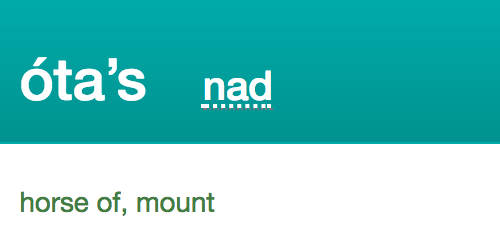Dependent nouns are nouns that require a possessor to be grammatical.
For example, look at two different words for ‘horse’ in Blackfoot: ponokáómitaa (na) and óta’s (nad). Ponokáómitaa can be used for any horse, but óta’s can only be used to refer to someone’s own horse. That’s why it is sometimes translated as ‘mount’ or ‘saddlehorse’.
You can say in Blackfoot: Amo ponokáómitaawa ‘This is a horse’. But you cannot say: Amo óta’sa with the meaning ‘This is a horse’, because you have to say whose horse it is. So you can say: Amo nóta’sa ‘This is MY horse’.
The difference between these two words is that ponokáómitaa is an independent noun, whereas óta’s is a dependent noun. Dependent nouns are considered to be inherently possessed: to use them correctly, you must always indicate who owns them by adding a possessor. In the dictionary, dependent nouns have an extra d in their category label: nad for animate dependent nouns, nid for inanimate dependent nouns, and nxd for indeterminate gender dependent nouns.

Most words for kinship terms are also dependent nouns in Blackfoot.

